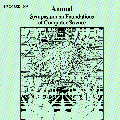The Local Computation Algorithm (LCA) model is a popular model in the field of sublinear-time algorithms that measures the complexity of an algorithm by the number of probes the algorithm makes in the neighborhood of one node to determine that node's output. In this paper we show that the randomized LCA complexity of the Lov\'asz Local Lemma (LLL) on constant degree graphs is $\Theta(\log n)$. The lower bound follows by proving an $\Omega(\log n)$ lower bound for the Sinkless Orientation problem introduced in [Brandt et al. STOC 2016]. This answers a question of [Rosenbaum, Suomela PODC 2020]. Additionally, we show that every randomized LCA algorithm for a locally checkable problem with a probe complexity of $o(\sqrt{\log{n}})$ can be turned into a deterministic LCA algorithm with a probe complexity of $O(\log^* n)$. This improves exponentially upon the currently best known speed-up result from $o(\log \log n)$ to $O(\log^* n)$ implied by the result of [Chang, Pettie FOCS 2017] in the LOCAL model. Finally, we show that for every fixed constant $c \geq 2$, the deterministic VOLUME complexity of $c$-coloring a bounded degree tree is $\Theta(n)$, where the VOLUME model is a close relative of the LCA model that was recently introduced by [Rosenbaum, Suomela PODC 2020].
翻译:本地 Computation Algorithm (LCA) 模型是亚线性算法领域一个受欢迎的模型,它用一个节点附近一个节点的检测器数量来测量算法的复杂性,以确定节点输出。 在本文中, 我们显示, 恒定度图形中Lov\'as 本地Lemma (LLLL) 随机化的 LC 复杂度为$@theta(\log n) 。 通过证明在 [Brandt 和 STOC 2016] 中引入的无辛醇性方向问题, 以较低约束值衡量算法的复杂性。 这回答了一个问题: [Rosenbaum, Suomela PoDC 2020] 。 此外, 我们显示, 美元(sqrick) 的随机化LLLLLLLL 算法复杂度, 它可以转换成一种确定性 LCLOO_O_Oxxxxxxxxxxxxxx 。





